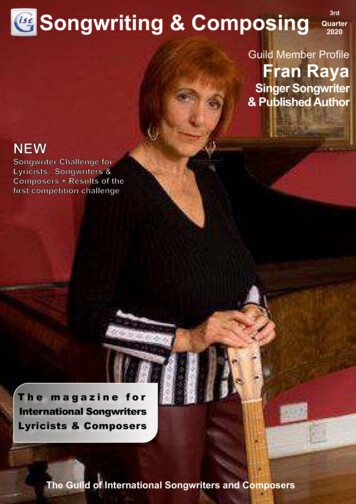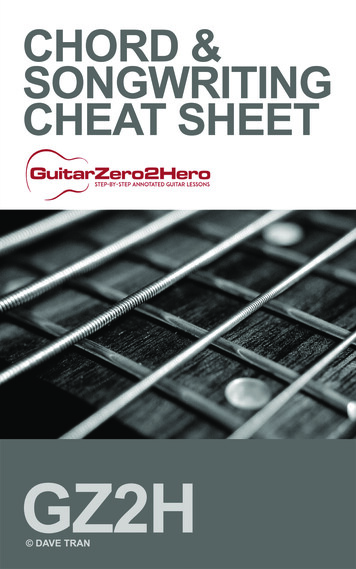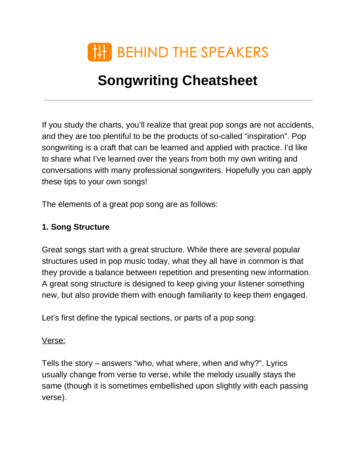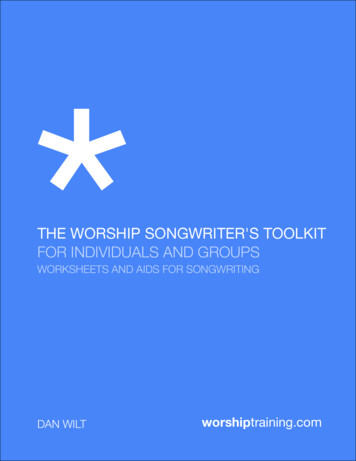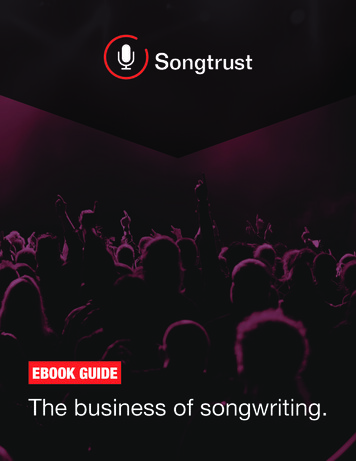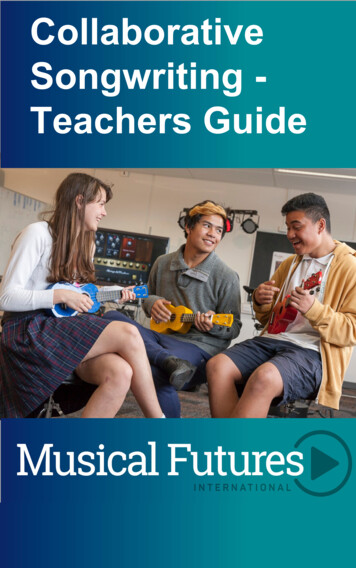
Transcription
Songwriting & Composing4thQuarter2020NEWSongwriter Challenge forLyricists , Songwriters &Composers Results ofthe second competitionGuild Member ProfileDuncan HopperThe magazine forInternational SongwritersLyricists & ComposersSongwriter, author,film financier, movieproducer, writer ofscreen plays,booksand documentariesThe Guild of International Songwriters and Composers
charge to members, with some valuable and uniqueprizes to be won in each section. The song writingchallenge is ‘specifically themed’ every quarter andthere will a winner in each category of best lyric, bestsong and best instrumental composition.SONGWRITING AND COMPOSINGIs the Magazine for International Songwriters andComposers, is published by The Guild ofInternational Songwriters and Composers. Therange of services available to Guild members,being amateur and professional songwriters,composers, lyricists, artistes, singer /songwriters,offers an exciting opportunity to enable theprogression of the songwriters’, composers’ andperformers’ craft, to assist with the placement ofthe songwriters’, composers’ and performers’works and recordings and any necessaryinformation required regarding the music industry.INTERNATIONAL SONGWRITERS ANDCOMPOSERS COLLABORATIONREGISTERIf you are unable to write melodies or lyrics then youmay need a partner with whom to collaborate. TheGuild’s Collaboration Department can put you in touchwith other members seeking to collaborate. Guildmembers who wish to be included on the CollaborationRegister should notify the Guild. This service is freeof charge to all members and most GISC members,normally, give full particulars for inclusion on the registerwhen applying for membership.COPYRIGHT SERVICEThe Copyright Service, which was established in1986, provides the opportunity for members toregister their rights of ownership and copyrightworks FREE of charge, therefore, safeguarding theGuild members’ copyright. A Copyright Certificateis issued to the Guild member outlining details ofthe copyrights registered on that specific date. TheCopyright Service can be used for the registrationof songs, instrumental themes, manuscripts, lyricsheets, paper documents, poetry, traditionalarrangements of songs/ instrumentals, musicals,poetic, dramatic, recorded works. Full details aregiven in the membership pack upon joining.MUSIC BUSINESS CONSULTANCYAND ADVISORY SERVICEThe Guild offers free advice to its members with regardto problems that may exist within the music industry orwith any difficulties a member is experiencing. Legaldocuments and contracts can be examined as to theirvalidity and fairness and the Guild can also advisemembers on their right to receive royalty payments.Contact info for publishers, artistes, record companies,management companies, etc and much more. Again,this is a free service to all Guild members.TOPICS, NEWS AND SONGSEARCHINVESTIGATION SERVICEPart of the Guild’s magazine, which containsinformation outlining the requirements and musicalstyles of publishers, record companies, artistes,managers, producers, etc seeking songs andartistes.The Guild assists, free of charge to members, withinformation on the business or company with which themember intends to deal. The Guild can act as arbitratorbetween members and other parties and can advise onmany aspects of the music industry.SONG ASSESSMENT SERVICEDEMONSTRATION RECORDINGSERVICEMembers may have their songs, lyrics,instrumental themes, performances, productions,etc assessed and analysed. The Guild givesopinions as to the quality and commercial value ofsongs, performances, lyrics and manuscripts. Allsongs/performances sent by email to the Guild’sAssessment Department at gisc@songwritersguild.co.uk will be analysed free of charge.NThe Guild works in association with Songwriting,Composing and Musical Productions (S.C.A.M.P.)recording studio and members who wish to have demosproduced may submit their songs for recording throughthe Guild.WHILST EVERY EFFORTHas been made to ensure the accuracy of theinformation in this publication, no responsibility can beaccepted by the publishers for any errors or omissionsor for the return of promotional material.QUARTERLY SONGWRITING CHALLENGEFOR LYRICISTS, SONGWRITERS &MUSIC COMPOSERSEWThe Guild’s quarterly songwriting challenge, for lyricists,songwriters and music composers to enter free of1
Guild Member ProfileDuncan HopperSongwriter, author, film financier, movie producer, writer of screen plays, boks and documentaries.Duncan Hopper is a Londoner who has lived in Brightonfor over 30 years. A Film Financier and Producer forMagicHour Media he is also author of “Stopover Stories”,has written for trade magazines and national newspaperssuch as The Independent and is a credited screenwriter fortwo documentaries.He was Executive Producer on "A Good Woman" the screenadaptation of Oscar Wilde's Lady Windemere's Fan starringHelen Hunt and Scarlett Johannsson and is currentlyworking on “Travels with my DNA” short stories from aroundthe world.A GOOD WOMANSet in the 1930’s on the beautifulAmalfi coastline. A GOODWOMAN is an elegant, wittyromantic comedy based on LadyWindermere's fan by OscarWilde.A tangled web of intrigueemerges as a young couplesmarriage is put in jeopardy. Adark family secret lies beneaththe surface. Directed by MikeBarker award winning g directorfor the Handmaids Tale. It starsHelen Hunt, Scarlett Johansson and Tom Wilkinson.Duncan Hopper Executive producer for Magichour Media.A worldwide release which did well in the US, Japan,Australia and Europe.DocumentariesTHE RIVER SEINE - PARISA film by Mark Nelson for First LightFilms. Original music by MarkNelson. 30 Minutes. The majesticSeine flows through Paris the capitalof France. The ancient river bearswitness to the history of thismagnificent City.The Seine and Parishas seen the early French Kings andthe first Paris tribe that inhabited itsbanks. The rise of the Sun King, theturbulence of the French revolutionand Foreign Invaders. A spiritual journey, from the Arc DeTriomphe to the Eiffel tower and the modern miracle of LesArcs.Script research by Nadia Hopper. Script by DuncanHopper. Voice over Michael Jayston. Available by enquiry.Available on Amazon. Duncan Hopper is author of"Whatever Happened to Lyn Roe?”As a prolific writer, Duncan has written numerous highlyacclaimed books, the majority of them are available topurchase on Amazon Books. We recently received fromDuncan, a review copy of his latest book entitled ‘TheCanterbury Lockdown Tales’ and we thoroughly enjoyedreading it and would highly recommend it.In early 2020 a group ofpilgrims is meeting at aBlackfriars Hotel on theThamestowalktoCanterbury. They are a mixedbunch of characters all, someEnglish and some fromoverseas. They assemble inthe morning when they areinformed the walk has beencancelledduetothelockdown. The book tells theirstories.Available on Amazon BooksAdditional books written by Duncan include
Musicals written by Duncan includeMARILYN THEMUSICALOriginal LyricsbyDuncanHopper. Musicby Luca Celano.TheoriginalplayaboutMarilyn Monroewasadaptedand performedat The BrightonFringe Festivaltocriticalacclaim. It wasthen taken up ina cooperationwith LaurenceMyers and TomKinnimont, successful West End producers, and adaptedby Tom with a score from Marilyn’s films and a plotfeaturing the character of Billy Wilder as the narrator.This was performed at RADA in London starring TomConte.Marilyn Monroe personified Hollywood glamour with anunparalleled glow and energy that enamoured the world.Although she was an alluring beauty with voluptuouscurves and a generous pout, Marilyn was more than a'50s sex goddess. Her apparent vulnerability andinnocence, in combination with an innate sensuality, hasendeared her to the global consciousness. Shedominated the age of movie stars to become, withoutquestion, the most famous woman of the 20th century.In this new production experience Marilyn's rise to fame;combining dutiful biography and speculation, thisengaging drama is an incisive take on the life of MarilynMonroe.Duncan has had adistinguished career inbusiness, however, hisfirst love is writing playsand books. Previousworks such as, LynRoe, I and LadyMontagu and Helen'sShadow, have beenwell received. He hasspecially adapted thisshow for the BrightonFestival.On a script writing study programme, Duncan met LiamBadger a Film producer. They pooled their resourcesand launched Magichour Media, which with its syndicateof investors, produced “Ashes and Sand“ with NickMoran and “A Good Woman” with Scarlett Johannsenand Helen Hunt. They both did well at the Film box officein the UK, US, Europe and the Far arilyn - A Musical Drama & Whatever Happened ToMarilyn? Two separate productions, Marilyn - A MusicalDrama, and the play, Whatever Happened to Marilyn?Both by Duncan Hopper, Presented by MagicHourTheatre.Marilyn The StarIt is 2006. An old woman may hold the key to a darksecret about Marilyn Monroe. In her memory, her carersbecome characters from Marilyn's life, as she relives thestars triumphs and tragedies. But is she blurring fantasyand reality?3
Copyright and Music - The Right Way To Protect Your RightsIfyouenjoysongwritingandrecording your ownmusic then youprobably just want toconcentrate on that,but it is worth taking afew steps today that cansave a mountain of trouble later on. Registeryour work:As a songwriter, if you want to get published,or even if you self publish your work, you willbe sending copies to your agents, recordcompanies, or other individuals. Can you trustthose who get hold of your work to respect yourrights, or will you discover one day that yourmusic is being passed off as someone else'swork, while you miss out on the royalties?By registering your copyrights, you place onrecord verifiable proof of your copyright claim.This means that you can prove your claim toa copyright should the person copying yoursongs claims they wrote them first.The Guild of International Songwriters &Composers' www.songwriters-guild.co.ukCopyright Service provides the opportunity forsongwriting and composing members of TheGuild of International Songwriters andComposers to register free with the Guild'sCopyright Registration Centre for copyrightprotection their songwriting and composingcopyrights and ownership of their own andco-written works (songs/instrumentals) withother Guild members copyrights andintellectual property rights FREE of chargewithin their membership, therefore,safeguarding the Guild members' songwritingcopyright and other intellectual copyrights.A Copyright Certificate issued to the Guildmember outlines details of the copyrightsregistered on any specific date to help protectagainst any copyright theft, claim, infringementor dispute. Copyright protection through theGuild's members free Copyright Service canbe used for the registration of songs,instrumental themes, manuscripts, lyric sheets,paper documents, poetry, traditionalarrangements of songs/instrumentals,musicals, advertisements, spoken word,literary (consisting of or occupied with books),musical tutorials, manuals, literature or writtencomposition, artistic, belletristic, poetic,dramatic, recorded works, sound recordingssuch as demos, commercial releases, libraryrecordings, archive recordings, videos, films,mp3s, compact disc CDs, Copyright protectionthrough the Guild's Copyright and Intellectualproperty rights witnessing service is free to allGuild members of The Guild of InternationalSongwriters and Composers who wish toprotect their copyright and intellectual propertyrights.Q. How much does the Guild's CopyrightService cost? The Guild's Copyright serviceis only available to Guild members and is freewithin the songwriters and composersmembership How Long does the Guild'sCopyright registration last? Once you haveregistered your copyright (intellectual propertyrights) with the Guild then you do not have toregister the work again (unless there is asignificant change to the work songs/instrumentals). Your certificate is proofof the registration and your claim is held on ourfiles as evidence of your registration. Don't befooled into paying for further copyrightregistrations after a few years to someorganisations or companies who have set upa fee paying copyright registration service atan expense per song.There is no need to do this. In the UK forinstance your copyright is valid for 70 yearsafter your death where the work then passesinto Public Domain. Your membership to TheGuild entitles you to register as many of yourworks as you wish FREE of charge within yourmembership. The Guild's CopyrightRegistration Centre has operated its copyrightservice for its members for the past 35 years.Q. How do I register my works with theGuild?A. Registration is extremely simple and quick.All the information on how to use the freemembers copyright service is outlined in themembership pack you receive when youbecome a member.Q. Is there any reason for me to register myworks (songs/instrumentals)?A. Absolutely, yes. Registration is evidence ofyour claim to the fact that you wrote the workand that you have taken steps to identifyyourself as the true legitimate owner of thework(s) from a certain date in time. If you havea copyright case to defend where someonehas plagiarised/stolen your work, how are yougoing to prove that you wrote it and that youare the legitimate owner of the work. TheGuild's copyright certificate is evidence thatyou took steps to register the work as your ownand that the intellectual property rights areyours. It is extremely important to protect yourcopyrights which could be a valuable assetwhere royalty income/money is beinggenerated.Q. I have posted a copy of my works tomyself, but have heard this referred to asa poor persons copyright.A. Mailing a copy of the work(s) to yourself isnot a good practice in itself. This type ofevidence is problematic If the packet/envelopeis sealed with sellotape or stapled then it couldbe argued that it has been opened andresealed, and could be fake/corruptedevidence. We strongly advise against this typeof registration as a main registration but isgood as a secondary back up to a mainregistration in support.4Q. At what point should I register my worksfor copyright?A. As soon as you have finished writing /composing your song / instrumental and youare satisfied that the work(s) is finished thenthe moment it is written down (lyrics /manuscript) or recorded then that is the timeto register your copyright. You should do thisas quickly as possible before it is given toanyone for any purpose.Q. When promoting my song /instrumentals should I undertake to doanything to help protect my copyrights?A. The main priority is to ensure that you keepa copy of the letter you have written that youare sending with your demo, and to ensure thatyou get a certificate of posting with the nameof the person/company, to whom you aresending your copyrights. Evidence that yourwork(s) is in circulation is very important.Always use the copyright symbol or the wordcopyright on your lyric sheets and recordingsalong with your name and the year date.Ensure that you label everything (lyric sheets,manuscripts, recording media i.e cassette, CD,DVD mp3s, Video etc and their cases) withyour name, address, telephone number andemail contact.Mark all your work with copyright notices:A copyright notice is simply a piece of text thatstates that the work is subject to copyright andthe authors name, it is often followed by thephrase 'all rights reserved' which simply meansthat you withhold all rights to that work as isyour right under the work will still be subjectto copyright without one, and the 'all rightsreserved' statement adds nothing, (this isassumed unless you explicitly state that yourelinquish some rights). So why use them?Simple: It's a deterrent. It makes it clear toeveryone that your work is subject to copyright,and that you take your rights seriously.The standard format for copyright notices is 5elements:1. The word is "copyright" not to be confusedwith the word "copywrite" which is an entirelydifferent thing. Copyright means the right tocopy which only you have the authority to grantsubject to any assignments of copyrights thatyou may have made2. The internationally recognised copyrightsymbol 3. The year of publication - i.e 20204. The name of the copyright owner - i.e 2020 Joe Bloggs5. An optional statement of intent, (notrequired). For example: ' Copyright 2020 J.Bloggs. All rights reserved.' The being a Cin a circle is the normal copyright symbol andcan be applied to most types of work. It can befound in most word processor programs underthe 'insert' menu.
Closing Date: 30th November 2020websitehttps://www.songwritingcontest.co.uk/5
Exclusive vs Non Exclusive: Understanding Music Licensing DealsIn the case of an exclusive license agreement, you riskhanding out your hard work to a company who doesn’tget you a single placement. If you’re an indiesinger/songwriter, that could mean a couple of yearsworking hard to put together your album down the drainin the snap of a finger.Are you devaluing your music by signing non-exclusivelicense agreements?Do music supervisors privilege exclusive deals?What are the risks of signing an exclusive deal?Are you shooting yourself in the foot every time you signa non-exclusive deal with a new music library? Theseare some of the questions that come up every timemusicians receive an offer to license their music.With non-exclusive deals, the biggest risk is devaluingyour reputation as a serious music composer. Theemergence of hundreds of non-exclusive music librariesVisit the website: https://www.songdoor.com/pitching a similar catalogue with seemingly randomThe Non-Exclusive License Agreementprices has led music supervisors to focus on music theyDefinitionWhen you license one of your songs through a non- can license exclusively.exclusive agreement, this is what happens:Re-Titling Songs for Licensing - IllustrationYou are the licensorYou give the licensee (e.g. a production music library) How do you get the best of both worlds?Here’s a simple trick to enjoy the advantages of nonthe right to offer your song to a third-partyThe third-party can purchase the right to use your song. exclusive deals without being perceived as a littleThe licensee pays you part of the fee received from the nobody musician: use pseudonyms.third-partyYou can sign another non-exclusive agreement with So simple!another licensee to shop that same song around to There’s nothing stopping you from uploading some ofthird-partiesyour songs to non-exclusive music libraries under aAdvantages of the non-exclusive license agreementpseudonym. That leaves you free to place anotherYour song is not tied down with one company who may section of your catalogue with a more premium agencyor may not find you licensing opportunities and you can looking for exclusivity.maximize small opportunitiesNow to be clear: you should NOT, under anycircumstances, place a song in a non-exclusive libraryThe Exclusive License Agreementunder a pseudonym and then sign an exclusiveDefinitionagreement under your name for the same song.When you license one of your songs through an This is NOT what we're suggesting at all!exclusive agreement, this is what happens:What we are suggesting is that if your catalogue is bigYou are the licensorenough, you might want to offer say 10 tracks on anYou give the licensee (e.g. a production music library) exclusive deal and sign non-exclusive deals for anotherthe right to offer your song to a third-party. The third- 10.party can purchase the right to use your song. Thelicensee pays you part of the fee received from the Exclusive vs Non-Exclusive Music Licensingthird-partyAgreement - IllustrationYou can NOT sign another agreement with another How to mitigate the risks associated with exclusivelicensee to shop that same song around to third-parties. deals? Even when you have a fairly large catalogue,Note: we’re talking of exclusive deals that cover a given signing a few songs on an exclusive deal can be a littleset of songs. That is not the same as exclusive deals scary. There’s always the risk that the company isn’tfor the composer’s entire existing and future catalogue. going to get you the placement that would make yourDefinitely don’t sign one of those unless you get initial music making investment worthwhile.paid a huge advance!Here are some things I do to limit that risk to aAdvantages of the exclusive license agreementminimum:Music supervisors are more likely to consider it because Research the companythey know they’re getting the best price i.e. there are Trying to figure out if they’re likely to place your music not 20 music libraries selling the same track for less and How long have they been around?the song won’t be used on 100 low-quality projects, thus Are they currently a big player?devaluing the project the music supervisors working on What are the chances that they’ll just disappear (takingYou are more likely to get a fair price for the sync fee your songs with them) in the next few years? unless you gave exclusivity to a really cheap music Do they have a huge roaster of composers or will theylibrary. Don’t do that. That’s a crazy thing to do!be hands on and dedicated to my music?AdvanceIf you can negotiate it that is . A tough ask, especiallywhen you’re just starting out. Biggest risks when yousign an exclusive or non-exclusive agreement?Finally, limit the costs of making musicWhy? So that, if the library never places your tracks,you haven’t just wasted 20 hours of your time and Xamount of money on one song that’s never going tomake you any money.6
Visit The Website To Submit Your Song: https://jlsc.com/7
WARREN BENNETT - INTERVIEWED BY DAVID A ELLIS.Songwriter, musician and film score composer Warren Bennett is the son of Shadows drummer BrianBennett. Warren Bennett was born in July 1962 and before deciding on a musical career wanted to becomea sports journalist. At school he played in various bands and before leaving at sixteen decided music wasthe path he wanted to take.He added a middle eight and it went on the album. Itwas called 'Cute'. ITV Television picked it up, so I gotlucky with my first piece.DAE: Did you always want to be involved in musicand were you inspired by your dad?WB: Not always. I did want to be a journalist at onepoint. I did a postal course when I was fourteen. I wouldhave loved to have been a sports journalist. I was invarious bands at school and I can't remember exactlywhen I decided to go for a musical career, but it wouldhave been at some point before leaving school atsixteen. Dad would have encouraged me in whateverchoice I made.DAE: What was your musical training - did you goto university to study music?WB: I didn't go to university or attend music school. Iam basically self taught and when I was young if therewas an album I liked I'd also buy the songbook and Ilearnt from those. I had about four piano lessons atschool but got bored. Same with the violin. I did playpercussion in the school orchestra. If I ever had aproblem with anything when I lived at home I wouldalways ask dad. Things like, "what's this chord called?"DAE: Do you write music and words?WB: I've always written songs, even when I'm busycomposing a score. I find it quite relaxing, to be honest.A band I was in, in the 1980s called 'Glass Ties', had acouple of single releases on EMI and I wrote those foursongs. I had a track on a Shadows album called 'YouRescue Me', which I wrote the lyrics for. I've also hadto write songs for various TV shows and films that I wascomposing for. I've had various tracks I've writtencovered by a few people. Recently I co-wrote a fewtracks on an album by English singer/songwriter MichaelArmstrong that I also produced. We are currently writingagain. I have also started writing with Mike Read, theEnglish disc jockey.DAE: How old were you when you learned to playan instrument, read music and what was theinstrument?WB: I played drums from a very early age. I started toplay around on the piano at about the age of twelve.Then the guitar followed that. I have never learnt to readmusic very well at all. I can look at something and figureit out but I can't sight read.DAE: How do you relate to production people, forexample a director who is not musicallyknowledgeable?WB: Well, the man thing to remember is that you areworking for them. I am not fussed about a directorhaving limited musical knowledge. It is my job to helphim. He'll still know what he wants and if it takes a bitof time to find out what that is, so be it. It is all acollaboration. The director/composer friendship is veryimportant. I would also add that the editor is also in thatmix.DAE: How many instruments do you play and whatare they?WB: I mainly play and write on piano. I am ok on theguitar and I love playing bass. I still play drums as andwhen I need to. I can figure stuff out on otherinstruments, if I need to. On the Cliff and the Shadowsreunion tour I had to play the accordion on one songand the harmonica on another, but I wouldn't say I wasgood at either.DAE: What got you interested in scoring for filmsand TV?WB: I've always been fascinated by score. I loved thescores to the TV shows I watched as a kid.'Thunderbirds', 'The Persuaders' and many others. ThenI remember Dad playing John Barry albums. When I leftschool I worked for Bruton Music for a few years in theiroriginal offices in Bruton Street, London. That was agreat education into watching composers writing to abrief. I learnt so much there.DAE: I see you wrote a piece for ITVs SummerPromotional Campaign when you were fifteen. Howdid you get this opportunity?WB: That was a piece of library music. Actually the firstlibrary music piece I ever wrote. I was fourteen at thetime and Dad was making an album for Bruton Musicof light happy go lucky tunes. It was a brief given to himand I played him something I'd written and he loved it.DAE: What kind of films are you drawn to as far ascomposing goes, are you happy to tackle any genre?8
WB: I am very happy to tackle any genre. I scored myfirst horror film recently called 'Tales from the Lodge',written and directed by Abigail Blackmore. I Lovedworking on it and Abigail was a delight.DAE: Have you a favourite film/TV production youhave worked on?WB: I've enjoyed them all. I can honestly say I've neverhad a bad experience. 'New Tricks' was special. Thewhole crew was a very happy family. I scored nine seriesof that show. There were some great directors andeditors that I met on that production.DAE: If you get several offers what is it about ascript that would make you choose?WB: I think apart from the script being appealing, itwould be the director and the producer. With somescripts you can start to hear what kind of music you'dlike to write while reading it. If that happens I am usuallykeen to start right away.DAE: Do you watch a rough cut of the film to get afeel for it and do you like to be involved at scriptlevel?WB: I like to go to the script read through, if possible. Iusually get the script up front but it's far better to hear itbeing read by the cast. I'll always watch the rough cutand then final cut before a music spotting session. Youneed to be prepared for the director. If there is time Imay start writing before the music spotting session,sometimes after reading the script or attending the readthrough. If it is something I feel is working I'll send somerough ideas to the editor and director. If they like it, theycan use it as a temp score.DAE: What was your most challenging job?WB: I'm not sure if it counts as challenging but Iremember one of the 'Birds of a Feather' Christmasspecials I did. I had the full cast along with guest RayWinstone in the studio to sing a rocked up version of'The Twelve Days of Christmas'. I believe the sessionstarted after the pub had opened. Let us leave it at that.Actually Ray also had to sing a couple of Elvis numbersfor that episode. He was great. Elvis was alive and wellthat day.DAE: Do you find musical ideas come easily to you?WB: I do to be honest. I have never experiencedanything along the lines of writers block. That is not tosay everything is always worth pursuing. I have a ton ofonce great ideas that will never see the light of day.DAE: Have you ever tried to tackle everything thathas been offered?WB: I have. I remember one occasion where that got abit out of hand. I was scoring 'London's Burning', sixteenepisodes a year and another programme called'Ambassador', eight episodes a year. At the same timeI was on a UK/European tour with Hank Marvin. Iremember doing a concert in Copenhagen, getting upthe next day, which was a day off at five am to get aflight home to attend a spotting session and then goinghome to write through the night. Then it was up earlythe next day to get back to Copenhagen for the nextshow. That happened a lot on that tour. By the time I'dfinished the tour and both programmes, I was completelyexhausted.DAE: Are you versatile can you work in severalareas?I like to think so. I'll never turn down a challenge. Nothingis impossible.DAE: Before you forget an idea do you get it downon a small digital recorder?WB: I'm always putting ideas down on my phone, frompiano or guitar sketches to even humming or singing anidea when out on a walk. Before the phone I usedcassettes.DAE: Do you enjoy arranging as much ascomposing?I do like arranging. With some collaborations I have doneI have just been sent a top line and chords. I enjoyfleshing those out.DAE: Do you ever worry that a piece you havescored is very similar to one that is already out there?WB: I do, especially when I think it's good. I think allcomposers have that feeling sometimes. If I amparticularly worried I'll send it to someone and ask themif they have heard it before.DAE: Do you always sit in on recording sessions?Well, if they are my sessions, of course. I don't conductif
Songwriting & Composing Guild Member Profile Duncan Hopper Songwriter, author, film financier, movie producer, writer of screen plays,books and documentaries 4th Quarter 2020 The magazine for International Songwriters Lyricists & Composers NEW Songwriter Challenge for Lyricists , Songwr
